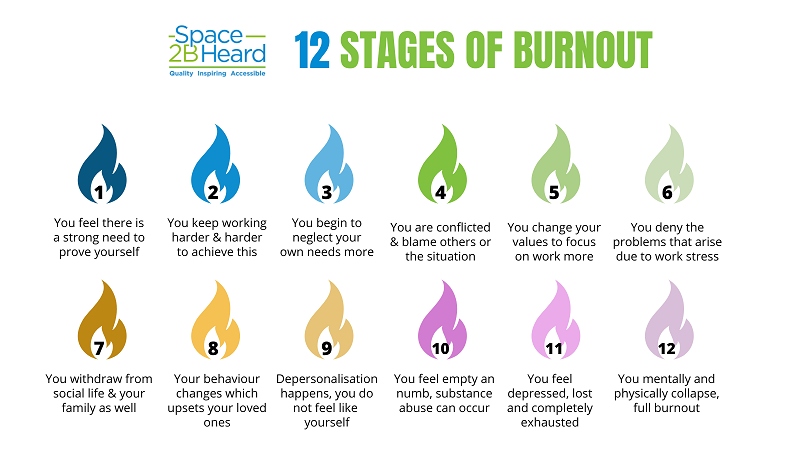You may have seen news reports or read articles about the ‘Great Resignation’ within the last few months. The impact of the pandemic on the workplace has been significant, with around 85%* of UK businesses affected by high levels of resignation as people were forced to stay at home. They took the opportunity to rethink their work/life balance and discover how they could achieve something better. The result of workers resigning at an unprecedented rate has led to significant increases in workload for those left behind and employers are struggling to recruit enough people to plug the gaps. This has led to some workers experiencing a state of exhaustion, both physically and mentally, known as ‘burnout’.
What is burnout?
Everyone copes with stress and stressful situations differently, and some people have a natural capacity for dealing with it, or even thriving on the adrenaline. However, according to an article on the Mental Health UK website based on research undertaken during March 2021, 20% of UK workers ‘felt unable to manage pressure and stress levels at work.’
When people have worked in a job role that is both physically and emotionally demanding or have gone through periods of long-term stress in their role, they may feel completely overwhelmed and exhausted. Unfortunately, this condition will not suddenly go away, or cure itself over time. In fact, if the signs of ‘burnout’ are not recognised and the underlying causes not addressed and rectified, the condition could cause more harm to an individual’s mental and physical health.
What are the symptoms of ‘burnout’?
If you are feeling totally overwhelmed by work, with a bottomless ‘to-do list’, you may be suffering from ‘burnout’. Experiencing extremely high levels of stress in a job can be caused by a number of factors including uncertainty, a high level of demand for little reward, a lack of autonomy or independence and constant emotional pressure. Feeling helpless to rectify or change this situation can lead to feelings of:
- Self-doubt and imposter syndrome
- A negative attitude and outlook
- Putting things off
- Taking longer to complete tasks
- Helpless and overwhelm
- Being detached from reality – feeling abandoned and alone
Psychologists Herbert Freudenberger and Gail North discovered there were 12 stages of ‘burnout’, as depicted in the following image.

The World Health Organisation defines ‘burnout’ as being an occupational hazard, but the Mental Health UK report found nine contributory factors to the condition, only some of which apply solely to a work environment:
- Money worries
- Working from home
- Job security worries
- Isolation/loneliness
- Physical health
- Sleep problems
- Relationships
- Schooling children at home
- Caring for others
Their research suggests that changes to our normal everyday lives brought about by the pandemic, plus new additional pressures and stress from work contributed to ‘burnout’ and its impact on mental and physical wellbeing. The good news is that there are some things you can do yourself to try to prevent ‘burnout’:
Take some time off: Even if you have to use up those precious holidays, your health is worth it. Or restructure your day, so you can take a walk during the lunch hour to let go and regroup.
Rest and exercise: We know that this isn’t the cure all for everything but getting your mind to focus on physical exertion and the release of dopamine will help to combat feelings of stress and overwhelm. Have a bedtime routine, so that you can fall asleep quickly and let your system recuperate.
Mindfulness has been the buzzword of recent years, but the simplicity of focusing on your breathing and being conscious of now, this precise moment in time, can stop the whirring in your brain and give you a different perspective.
Look at your options: Is there something you can do to change things around? Someone you can talk to about your situation? Make sure you talk openly with your partner about any home worries and discuss ways of tackling them.
Find some support: Space2BHeard is a not-for-profit organisation providing high quality counselling, psychotherapy and wellbeing services to the people of Hull and the East Riding. We have a range of services available:
Workforce Wellbeing
We understand the impact of unwellness related to mental health, both on the employee and the employer. We also know from experience how difficult it can be to effectively support those who are struggling. We have therefore devised a number of products that can be bought to suit the needs of individual organisations:
- Workshops
- Tailored Wellbeing Events
- Counselling Packages
- Mental Health Champions
- Workplace Managers’ Enhancement Programme
- One-to-One Coaching
- Myers Briggs personality Sessions
- NLP Workshops
Space2BHeard has a wide range of experience working for a variety of partners. Our NHS approved management systems and staffing structure enable us to respond to our partners’ and clients’ needs quickly, safely and effectively.
Let’s Talk
The Let’s Talk Service has been available in Hull for almost six years and provides counselling and therapeutic options to individuals in our communities experiencing anxiety and/or depression.
Valued Minds is a low cost psychotherapy service which is provided by volunteer student psychotherapists. We are an independent service, accessible to anyone that has an income of less than £23,000pa ( N.B. We need proof of income in order to proceed with your referral.) Our passion is Transactional Analysis Psychotherapy, but our therapists integrate other therapy models to meet your needs.
Valued Minds
We work with a range of mental health presentations and issues including anxiety, depression, OCD, personality disorder, low self-esteem, relationship issues, childhood issues – anything in which you are committed to making a personal change.
Re-Mind
Re-Mind is a specialist service for people experiencing long term pain and/or fatigue symptoms. The experienced team work with a variety of conditions such as, Fibromyalgia, Chronic Pain, Chronic Fatigue Syndrome, Myalgic Encephalomyelitis (ME), Long Covid, ongoing medically unexplained symptoms and anxiety and depression as a result of physical symptoms.
Re-Mind offers a personalised and tailored programme in confidential group and one-to-one sessions using a variety of evidence-based models, including:
- Cognitive Behavioural Therapy
- Pacing
- Acceptance and Commitment Therapy
- Transactional Analysis
Our Long Terms Conditions Director and Re-Mind Manager, Gemma Wardall, is passionate about offering psychotherapeutic understanding, support and intervention for local people living in Hull and the East Riding.
At Space2BHeard, our mission is to provide the people of Hull and the East Riding with the counselling they need at the time they need it. If you think you may be suffering from ‘burnout’, anxiety, depression or long-term conditions such as Fibromyalgia, Chronic Pain, Chronic Fatigue Syndrome, Myalgic Encephalomyelitis (ME), Long Covid, contact us today to see how our therapists can help.


